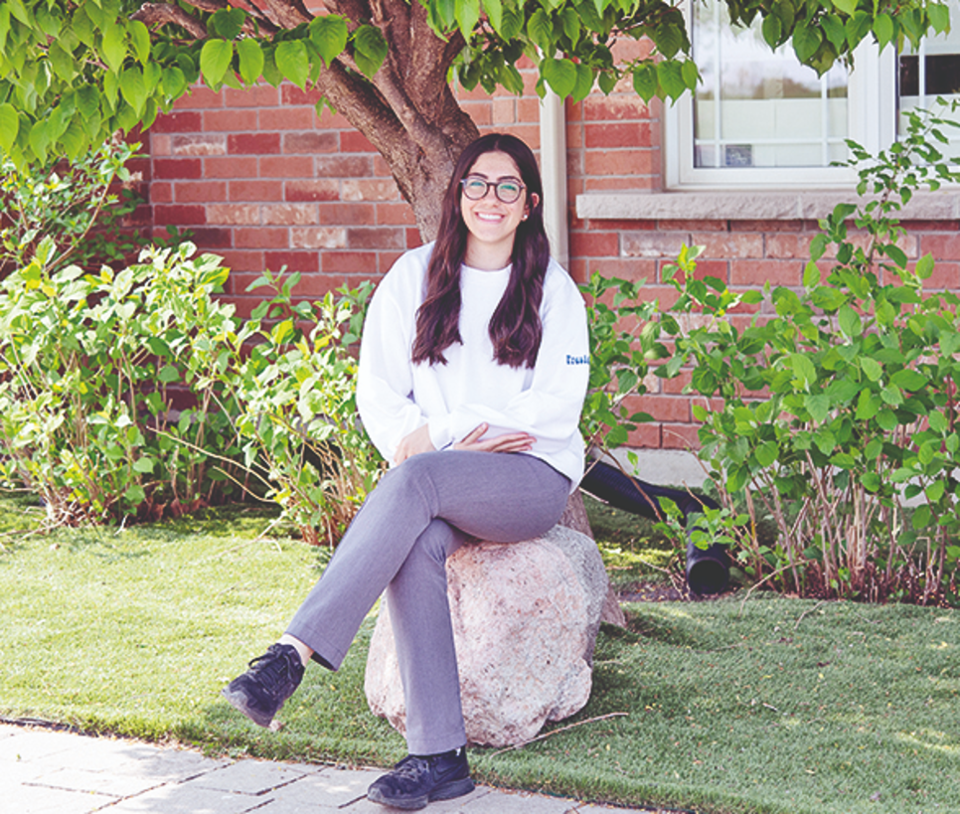Like so many Canadians, Nancy Shnoudeh grew up looking at Terry Fox as a perfect example of courage, determination and strength.
These principles have guided Shnoudeh through her high school years, where she has been recognized as a leader within the St. Maximilian Kolbe CHS community.
Now, as the Grade 12 student prepares for the next chapter of her life this fall, the legacy she will leave behind at St. Max, and indeed Aurora, has seen her be named one of 15 students across Canada honoured with a 2023 Terry Fox Humanitarian Award.
The award, which is comprised of scholarships valued at up to $28,000 each, recognizes young humanitarians who have demonstrated “extraordinary courage and determination in overcoming obstacles and positively impacted an area of critical need in society, while excelling in academics, athletics and civic life.”
“This is honestly such a big honour because Terry Fox and what he has done and represented for all Canadians,” Shnoudeh said. “Growing up in elementary school, we always heard stories about Terry Fox and he was one of those primary examples and first insight into what courage looks like, what determination looks like, and what strength looks like. Now being in a position where I have the honour of being awarded this in recognition of Terry Fox means so much to me because he has been such a great example to me.”
The 15 student award winners this year were selected from more than 840 applicants.
Shnoudeh was recognized for her volunteer work within the community and for serving on several committees during her high school years. Among these achievements was her creation of the Birthday Box program that curates exciting, age-tailored boxes for pediatric patients on their birthdays.
She also serves as president of St. Max’s Best Buddies chapter, a program that helps “nourish friendships between students, some of whom struggle with intellectual/developmental disabilities, and also leads the school’s mental health council.
“Nancy has overcome her own challenges with mental health and recognizes that mental health struggles can be a prominent hindrance to student success,” reads Nancy’s citation. “She is therefore committed to ending the mental health stigma so that every student feels valued and understood. Her work on the mental health council is a first step to what she hopes to accomplish long-term.”
Inclusivity is very important to Shnoudeh, she says, and is a field she hopes to pursue in her post-secondary career. But first, she started close to home.
“Our birthday boxes are just meant to make sure the children who are in hospital feel important on their birthdays and don’t feel overlooked,” she says. “I have always loved my birthday and it is so much fun, but I could never imagine spending my birthday in hospital, especially as a kid. The pediatric patients should be out having fun and doing all these things that children should be doing, so I feel their birthday is the one day, that opportunity where they can get that feeling. I wanted to make sure those children feel really special on their birthday because they are the strongest people in our community.”
Her leadership of the Best Buddies program is similarly a way she can help her peers of all ages have the same opportunities.
“It has been honestly amazing having that opportunity to work and serve through Best Buddies,” she says. “I am paired with a student with Down Syndrome and it has been really great building a friendship with him and he has taught me to appreciate all the smaller joys we can often overlook. Best Buddies really represents inclusion. We often talk about that as if it were a buzzword now, but what inclusion means down to its core is when you see someone, it’s about making eye contact with people, saying ‘hi’ to people, just really acknowledging the presence of people and making sure everyone feels their presence is important and acknowledged rather than ignoring or walking past. All those smaller aspects are what really create inclusivity at its core, all those smaller, actionable steps to really build a stronger community.”
After she finishes her final year at St. Max, she hopes to be able to get down to business tackling those actionable steps in a wider way. Pursuing industrial engineering at university, she wants to focus on “building things” for the greater good.
“I am excited to go into engineering because it gives me the opportunity, knowledge and skills to build things that better my community and build solutions to problems that impact human welfare,” she says. “That can be building solutions that help people struggling with mental health and provide different therapies, whether it is through medicinal treatments or other technologies, or ways we can help people.
"In regards to people who are struggling with disabilities, that can mean building more accessible playgrounds and engineering those kinds of things structurally. Even on the software side of things, creating walking routes that are safer for people, for example, creating algorithms, designing those kinds of things that can provide women a safer walking route based on updating news data and that is something I worked on previously.”
Brock Weir is a federally funded Local Journalism Initiative reporter at The Auroran



